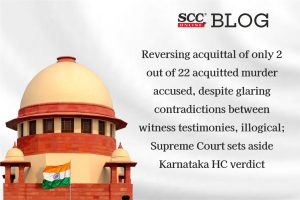Supreme Court: In an appeal against the Karnataka High Court's reversal of acquittal of 2 out of the 22 accused acquitted by the Sessions Court in a murder case, the bench of V. Ramasubramanian*and Indira Banerjee, JJ has reversed the High Court's verdict observing that there were glaring contradictions between the testimony of the witnesses.
In this case all the 22 accused armed with deadly weapons formed themselves into an unlawful assembly and committed trespass by entering into the house of the deceased and committed his murder, in furtherance of a common object. The Sessions Court acquitted all 22 accused including the appellants, however, the High Court convicted the appellants, by observing that there was consistency in the evidence of eyewitnesses with regard to their participation in the commission of the offence and the Trial Court erroneously acquitted them, when there was sufficient material on record to hold them guilty.
The Court observed that the above findings of the High Court appear to be illogical as the primary charge of the prosecution was that all the 22 accused, formed themselves into an unlawful assembly with the common object of committing the murder of the deceased and that all of them being members of the unlawful assembly were armed with deadly weapons and that they committed the offence of rioting, trespass and murder.
The Court observed that:
“We do not know how, in the facts and circumstances of the case, the conviction of only 2 out of the 22 accused can be sustained and that too only for the offence under Section 302 when the allegation of unlawful assembly, common object, trespass, rioting etc. are held not proved against all of them”.
Moreover, the State has not come up with any appeal against the acquittal of all the other accused nor was there any explanation as to why there were two First Information Reports.
The Court took note of the ruling in Arvind Kumar v. State of Rajasthan, 2021 SCC Online SC 1099 wherein the court held that “the principle that when a witness deposes falsehood, the evidence in its entirety has to be eschewed may not have strict application to the criminal jurisprudence in our country”, and thus viewed that the High Court was right that the evidence of eyewitnesses cannot be rejected by invoking the theory of ‘falsus in uno falsus in omnibus', as this principle may not have unadulterated application to criminal jurisprudence. However, when there are glaring contradictions between the testimony of these two witnesses on the type of material object used and even on the role of one accused, the very foundation of the case of the prosecution stood shaken.
The Court observed that the High Court should have come up with stronger and cogent reasons than what has been recorded as the law on the scope of Section 378 of the Code of Criminal Procedure (CrPC), is too well settled.
Placing reliance on Ravi Sharma v. Government of NCT of Delhi, 2022 SCC Online SC 859 the Court viewed that the impugned judgment of the High Court is not in accordance with the law traced in this decision, hence, the conviction of the appellants cannot be sustained.
[Ramabora v. State of Karnataka, 2022 SCC OnLine SC 996 , decided on 10.08.2022]
*Judgment by: Justice V. Ramasubramanian

